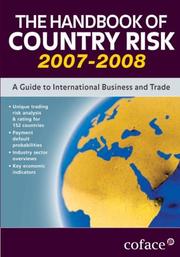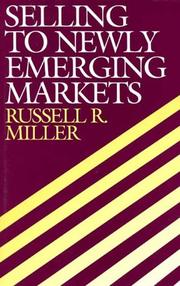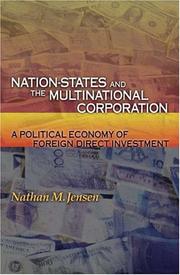| Listing 1 - 10 of 15 | << page >> |
Sort by
|

ISBN: 128113550X 9786611135508 1846730716 9781846730719 9781846730702 1846730708 Year: 2007 Publisher: London Sterling, VA Coface :GMB Pub.
Abstract | Keywords | Export | Availability | Bookmark
 Loading...
Loading...Choose an application
- Reference Manager
- EndNote
- RefWorks (Direct export to RefWorks)
This 9th edition of The Handbook of Country Risk is an invaluable resource both for companies developing international trade and for entrepreneurs and their advisors concerned with international investment. Compiled by Coface, the world's number one in insurable trading risks, this authoritative reference source provides up-to-date analysis of the risks involved in trading with or investing in 154 countries, giving each one a unique risk rating. For finance departments, the handbook crucially assesses the likelihood of payment default and for business developers and would-be investors, it weig

ISBN: 0313008027 9780313008023 1567200443 9781567200447 9798216012764 Year: 1998 Publisher: Westport, Conn. : London : Quorum Books, Bloomsbury Publishing,
Abstract | Keywords | Export | Availability | Bookmark
 Loading...
Loading...Choose an application
- Reference Manager
- EndNote
- RefWorks (Direct export to RefWorks)
Export marketing --- Foreign trade promotion --- Risk management --- Country risk --- Country risk, Political --- Political risk (Foreign investments) --- Risk --- Former Soviet republics --- Europe, Central --- Economic conditions.
Periodical
Publisher: Syracuse, NY : PRS Group, Inc.
Abstract | Keywords | Export | Availability | Bookmark
 Loading...
Loading...Choose an application
- Reference Manager
- EndNote
- RefWorks (Direct export to RefWorks)
Country risk --- Risque pays --- Sudan --- Soudan --- Sudan. --- Economic conditions --- Social conditions --- Politics and government --- Conditions économiques --- Politique et gouvernement

ISBN: 0691122229 069113636X 1400837375 1282964631 9786612964633 9780691136363 9780691122229 9781400837373 Year: 2006 Publisher: Princeton Princeton university press
Abstract | Keywords | Export | Availability | Bookmark
 Loading...
Loading...Choose an application
- Reference Manager
- EndNote
- RefWorks (Direct export to RefWorks)
What makes a country attractive to foreign investors? To what extent do conditions of governance and politics matter? This book provides the most systematic exploration to date of these crucial questions at the nexus of politics and economics. Using quantitative data and interviews with investment promotion agencies, investment location consultants, political risk insurers, and decision makers at multinational corporations, Nathan Jensen arrives at a surprising conclusion: Countries may be competing for international capital, but government fiscal policy--both taxation and spending--has little impact on multinationals' investment decisions. Although government policy has a limited ability to determine patterns of foreign direct investment (FDI) inflows, political institutions are central to explaining why some countries are more successful in attracting international capital. First, democratic institutions lower political risks for multinational corporations. Indeed, they lead to massive amounts of foreign direct investment. Second, politically federal institutions, in contrast to fiscally federal institutions, lower political risks for multinationals and allow host countries to attract higher levels of FDI inflows. Third, the International Monetary Fund, often cited as a catalyst for promoting foreign investment, actually deters multinationals from investment in countries under IMF programs. Even after controlling for the factors that lead countries to seek IMF support, IMF agreements are associated with much lower levels of FDI inflows.
Country risk. --- International business enterprises -- Government policy. --- International Monetary Fund. --- Investments, Foreign -- Political aspects. --- Investments, Foreign --- International business enterprises --- Investissements étrangers --- Entreprises multinationales --- Risque pays --- Political aspects --- Government policy. --- Aspect politique --- Politique gouvernementale --- Country risk, Political --- Political risk (Foreign investments) --- 462 Economisch beleid --- Risk --- Political aspects. --- Internationaal monetair fonds --- International monetary fund --- Country risk --- 339.113 --- AA / International- internationaal --- Government policy --- Buitenlandse investeringen --- IMF. --- E-books
Book
ISBN: 1282077732 9786612077739 1846731127 9781846731129 Year: 2008 Publisher: London : Blue Ibex Ltd.,
Abstract | Keywords | Export | Availability | Bookmark
 Loading...
Loading...Choose an application
- Reference Manager
- EndNote
- RefWorks (Direct export to RefWorks)
his professional handbook provides up-to-date analysis of the risks involved in trading with, or investing in 155 countries. Individual country profiles include a description of strengths and weaknesses, information on conditions for market access, foreign exchange regulations and attitudes for foreign investors, and main economic indicators, such as import-export data, private/public consumption breakdown, standard of living, and purchasing power statistics. Each country is also given a unique risk rating. In addition, the book also provides a series of authoritative industry sector and regio
Periodical
Publisher: Syracuse, NY : PRS Group
Abstract | Keywords | Export | Availability | Bookmark
 Loading...
Loading...Choose an application
- Reference Manager
- EndNote
- RefWorks (Direct export to RefWorks)
Country risk --- Risque pays --- Iraq --- Iraq --- Iraq --- Irak --- Irak --- Irak --- Iraq. --- Economic conditions --- Social conditions --- Politics and government --- Conditions économiques --- Conditions sociales --- Politique et gouvernement
Book
ISBN: 0773420266 9780773420267 Year: 2010 Publisher: Lewiston, N.Y. Edwin Mellen Press
Abstract | Keywords | Export | Availability | Bookmark
 Loading...
Loading...Choose an application
- Reference Manager
- EndNote
- RefWorks (Direct export to RefWorks)
This compilation is an history of developing market finance and an examination of yield components in the focus countries of Central Europe. This study looks at Central Europe as a transition economy in constant flux. It illustrates how these countries can create a more profitable environment, attract more investment, and create a more stable economy.
Capital market -- Europe, Central -- Case studies. --- Country risk -- Europe, Central -- Case studies. --- Europe, Central -- Economic policy -- Case studies. --- Investments, Foreign -- Europe, Central -- Case studies. --- Stocks -- Prices -- Europe, Central -- Case studies. --- Capital market --- Investments, Foreign --- Stocks --- Country risk --- Prices --- Europe, Central --- Economic policy
Book
ISBN: 3319897519 3319897527 Year: 2018 Publisher: Cham : Springer International Publishing : Imprint: Palgrave Macmillan,
Abstract | Keywords | Export | Availability | Bookmark
 Loading...
Loading...Choose an application
- Reference Manager
- EndNote
- RefWorks (Direct export to RefWorks)
This book provides an up-to-date guide to managing Country Risk. It tackles its various and interlinked dimensions including sovereign risk, socio-political risk, and macroeconomic risk for foreign investors, creditors, and domestic residents. It shows how they are accentuated in the global economy together with new risks such as terrorism, systemic risk, environmental risk, and the rising trend of global volatility and contagion. The book also assesses the limited usefulness of traditional yardsticks of Country Risk, such as ratings and rankings, which at best reflect the market consensus without predictive value and at worst amplify risk aversion and generate crisis contamination. This book goes further than comparing a wide range of risk management methods in that it provides operational and forward-looking warning signs of Country Risk. The combination of the authors’ academic and market-based backgrounds makes the book a useful tool for scholars, analysts, and practitioners. .
Finance. --- Risk management. --- Risk Management. --- International Finance. --- Insurance --- Management --- Funding --- Funds --- Economics --- Currency question --- Country risk. --- Globalization. --- Investments, Foreign. --- International finance. --- International monetary system --- International money --- Finance --- International economic relations
Book
ISBN: 0820476595 3631533462 3631753640 Year: 2018 Publisher: Bern Peter Lang International Academic Publishing Group
Abstract | Keywords | Export | Availability | Bookmark
 Loading...
Loading...Choose an application
- Reference Manager
- EndNote
- RefWorks (Direct export to RefWorks)
The intensification of capital flows is an important characteristic of globalization. Attracting foreign direct investment is a viable way of ensuring the external financing of developing countries. Foreign direct investment flows, in turn, are determined by the decisions of multinational enterprises. One important determinant of investment decisions is the political environment of potential host countries. Political risks like expropriations, riots, revolutions or civil wars are important obstacles for investment. This book empirically analyzes the impact of political risks on foreign direct investment flows to Latin American countries. A case study of Mexico and its policy towards foreign investors offers further empirical evidence for the importance of the political environment for investment decisions of multinationals.
Investments, Foreign --- Country risk --- Investissements étrangers --- Risque pays --- Political science & theory --- Economics --- America --- Analysis --- Case --- Direct --- Direktinvestition --- Empirical --- Environment --- Foreign --- Foreign Direct Investment --- Institutional --- Investment --- Lateinamerika --- Latin --- Mexico --- Multinational enterprise --- Political --- Politische Steuerung --- Politisches Risiko --- Risk --- Stosberg --- Study --- with
Book
ISBN: 0566092379 9786613089540 0566092387 1283089548 9780566092381 1317158881 9780566092374 131715889X 9781317158882 9781283089548 6613089540 9781315574486 9781317158875 1315574489 Year: 2011 Publisher: Farnham, England ; Burlington, Vt. : Gower Pub.,
Abstract | Keywords | Export | Availability | Bookmark
 Loading...
Loading...Choose an application
- Reference Manager
- EndNote
- RefWorks (Direct export to RefWorks)
This valuable book shows how to interpret country performance and provides the practicing investor with sufficient background on economic principles, so that they better understand how to interpret country summaries as they appear in business periodicals and other media.Other books set out the criteria used in evaluating country risk and economic performance, but often do not clarify why particular elements of the analysis are important. Country Analysis explains the reasoning behind those criteria, without the need for a sophisticated understanding of economics or mathematics.
Country risk. --- Economic indicators. --- Political indicators. --- Country risk --- Economic indicators --- Political indicators --- Finance --- Business & Economics --- Investment & Speculation --- Investments, Foreign --- 339.3 --- Indicators, Political --- Political statistics --- Capital exports --- Capital imports --- FDI (Foreign direct investment) --- Foreign direct investment --- Foreign investment --- Foreign investments --- International investment --- Offshore investments --- Outward investments --- Capital movements --- Investments --- Business indicators --- Indicators, Business --- Indicators, Economic --- Leading indicators --- Economic history --- Quality of life --- Economic forecasting --- Index numbers (Economics) --- Social indicators --- Country risk, Political --- Political risk (Foreign investments) --- Risk --- E-books --- 331.30 --- 331.31 --- 336.312.3 --- 336.61 --- AA / International- internationaal --- Economische toestand --- Economisch beleid --- Solvabiliteit, kredietwaardigheid van de landen. Risicolanden --- Financieel beleid --- Investissement dans un pays étranger --- Observation et analyse économique --- Risque-pays --- Investissement dans un pays étranger --- Observation et analyse économique
| Listing 1 - 10 of 15 | << page >> |
Sort by
|

 Search
Search Feedback
Feedback About UniCat
About UniCat  Help
Help News
News